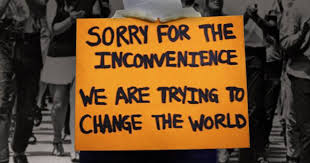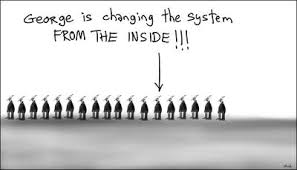 All this week on the BBC, there has been a focus on the NHS and the crisis we are in – don’t panic Mr Mainwaring…..There is a heady mix of opinions being thrown around – Question Time became quite a furore of ideas and thoughts last night – not enough beds, not enough staff, not enough money, too much money, too many patients, too many wasted appointments, too many malingerers, too many ill people, too many old people, too many managers, too many drugs, too many drunkards, disappointed clinicians, disappointed patients, disappointed MPs, a disappointed health secretary – what are we to think and what are we to do?
All this week on the BBC, there has been a focus on the NHS and the crisis we are in – don’t panic Mr Mainwaring…..There is a heady mix of opinions being thrown around – Question Time became quite a furore of ideas and thoughts last night – not enough beds, not enough staff, not enough money, too much money, too many patients, too many wasted appointments, too many malingerers, too many ill people, too many old people, too many managers, too many drugs, too many drunkards, disappointed clinicians, disappointed patients, disappointed MPs, a disappointed health secretary – what are we to think and what are we to do?
 We love the NHS because it speaks something to us about our togetherness and our commitment to health justice for all. This circular argument about money is the wrong conversation and it is beginning to have a very nasty undertone about who we might be able to blame and scapegoat in order to solve the mess we are in. Let’s be very clear. The NHS is NOT in crisis because of refugees, asylum seekers, immigrants or health tourists. I’m going to stick my neck out here – it isn’t even the fault of the current and previous health secretaries, though it would be easy to play the blame game that way too. The NHS is in crisis, because the entire Western World is in crisis! Our economic systems are broken and our political systems are pretty defunct. We have built our nation state on the foundations of empire. We have built our economy on conquest and slavery and have used debt, violence and law to keep control….but everything is shaking.
We love the NHS because it speaks something to us about our togetherness and our commitment to health justice for all. This circular argument about money is the wrong conversation and it is beginning to have a very nasty undertone about who we might be able to blame and scapegoat in order to solve the mess we are in. Let’s be very clear. The NHS is NOT in crisis because of refugees, asylum seekers, immigrants or health tourists. I’m going to stick my neck out here – it isn’t even the fault of the current and previous health secretaries, though it would be easy to play the blame game that way too. The NHS is in crisis, because the entire Western World is in crisis! Our economic systems are broken and our political systems are pretty defunct. We have built our nation state on the foundations of empire. We have built our economy on conquest and slavery and have used debt, violence and law to keep control….but everything is shaking.
There are some difficult truths for us to face up to. Are we brave enough to accept that things cannot remain as they are? Are we  brave enough to rewire our brains, realign our values and reimagine a different way of being together? If we accept that things simply cannot remain as they are, might we instead find one another in fresh ways and discover new ways of being in which we’re not always chasing the money, with all its strings attached, but choosing something altogether more life giving?
brave enough to rewire our brains, realign our values and reimagine a different way of being together? If we accept that things simply cannot remain as they are, might we instead find one another in fresh ways and discover new ways of being in which we’re not always chasing the money, with all its strings attached, but choosing something altogether more life giving?
 I would suggest we need two things (an ambidextrous approach) – both of which are already happening, we just need to recognise them, fan the flames and watch the new emerge, whilst Rome burns around us.
I would suggest we need two things (an ambidextrous approach) – both of which are already happening, we just need to recognise them, fan the flames and watch the new emerge, whilst Rome burns around us.
The first thing emerging is a grass roots people movement around health, wellbeing and a kinder society. Think of this as the left hand. We must take a left handed approach to really listen to and engage with our communities. Many people are waking up to the fact that we are eating in ways that are unnatural and completely unhealthy for the human being. Global corporations like GSK have shoved Lucozade and Ribena down our throats and then very kindly provided the medication for the diabetes we have developed. Enough! Thankfully, people are beginning to think about how we are living and making a change. It’s a tough reality, but there is personal and corporate responsibility that we need to take. We cannot keep shoving poison into our bodies or treating them badly and expect that we will be well, or that we will be able to afford the drugs to fix us. Social movements are beginning to emerge and we need to be a part of them. Together, we can! Together we can cause corporations to change their behaviour and act in accordance with what is right, true, just, kind and loving. We can also choose to take responsibility for what we buy and how much exercise we do. Here in Morecambe Bay we are launching the Morecambe Bay Mile, encouraging everyone to move a mile a day without transport! We’re also working with our communities around diet. We’re also connecting with amazing people doing amazing things and seeing just how much kindness and goodness there is in the communities around us. Our happiness is directly linked to the quality and depth of our friendships. People being together and facing up to the issues together is absolutely key to our long term health.
are beginning to think about how we are living and making a change. It’s a tough reality, but there is personal and corporate responsibility that we need to take. We cannot keep shoving poison into our bodies or treating them badly and expect that we will be well, or that we will be able to afford the drugs to fix us. Social movements are beginning to emerge and we need to be a part of them. Together, we can! Together we can cause corporations to change their behaviour and act in accordance with what is right, true, just, kind and loving. We can also choose to take responsibility for what we buy and how much exercise we do. Here in Morecambe Bay we are launching the Morecambe Bay Mile, encouraging everyone to move a mile a day without transport! We’re also working with our communities around diet. We’re also connecting with amazing people doing amazing things and seeing just how much kindness and goodness there is in the communities around us. Our happiness is directly linked to the quality and depth of our friendships. People being together and facing up to the issues together is absolutely key to our long term health.
 Secondly, we must stop serving the system, re-humanise it, call it in line and cause it to serve the needs of the people and the planet (the right handed approach). Those in the health and social care system must refuse to be bullied by the powers into ways of behaving, stop thinking they have the answers and therefore coming up with another new scheme to do to people and be willing to listen to and work with the emerging social movements. This will allow us to see a society that is much more well and therefore in need of less care. But where care is needed, we have to accept that we have allowed ourselves to be competitive rather than collaborative, hierarchical instead of co-operative and our own attitudes and behaviours are stopping us from giving the compassionate care we long to deliver. We cannot make excuses. We must let go of self-protectionism. We must be willing to change the way we think and behave, breaking down walls, letting go of suspicion and cutting through red tape so that we provide the care which we can. This is happening, here in Morecambe Bay – but it’s not a quick thing. We are rediscovering the power of relationship and daring to make some bold steps into delivering care very differently – but for those of you outside the system, please understand, it takes time and feels pretty scary!
Secondly, we must stop serving the system, re-humanise it, call it in line and cause it to serve the needs of the people and the planet (the right handed approach). Those in the health and social care system must refuse to be bullied by the powers into ways of behaving, stop thinking they have the answers and therefore coming up with another new scheme to do to people and be willing to listen to and work with the emerging social movements. This will allow us to see a society that is much more well and therefore in need of less care. But where care is needed, we have to accept that we have allowed ourselves to be competitive rather than collaborative, hierarchical instead of co-operative and our own attitudes and behaviours are stopping us from giving the compassionate care we long to deliver. We cannot make excuses. We must let go of self-protectionism. We must be willing to change the way we think and behave, breaking down walls, letting go of suspicion and cutting through red tape so that we provide the care which we can. This is happening, here in Morecambe Bay – but it’s not a quick thing. We are rediscovering the power of relationship and daring to make some bold steps into delivering care very differently – but for those of you outside the system, please understand, it takes time and feels pretty scary!
I believe it is possible for the NHS and Social Care System to be radically transformed at this time. It might enable us to model something for the rest of the world. That in our time of crisis, we did not sell out to the lie that the only way ahead was privatisation and insurance – (in our hearts, we know this isn’t fair and it doesn’t work for everyone). No – instead we chose to work with a grass roots people movement, calling for us all to be more healthy and well and we changed our ways of working to be more collaborative and kind. It is this ambidextrous approach to health and wellbeing, in which a heady mix of an invigorated people movement and a reorientated system working together for the good of everyone everywhere, might breathe hope into other parts of the world that out of the old can come something new. Maybe it is just possible that healthcare can be provided for everyone everywhere when people are brave enough to let go of old ways, embrace the brokenness of our reality and find a new way through together.
more healthy and well and we changed our ways of working to be more collaborative and kind. It is this ambidextrous approach to health and wellbeing, in which a heady mix of an invigorated people movement and a reorientated system working together for the good of everyone everywhere, might breathe hope into other parts of the world that out of the old can come something new. Maybe it is just possible that healthcare can be provided for everyone everywhere when people are brave enough to let go of old ways, embrace the brokenness of our reality and find a new way through together.
 I’m telling you – it is nearly Spring time and the bulbs are beginning to break through. Can you smell the scent of something new emerging? Those rhizomal roots of the snowdrops – that interconnected underground network that shoots up its flowers, is telling us the winter of discontent is over. It’s time to turn off the radio, dial down the meta narrative of fear and instead, put on love, hope and faith, find each other, change our ways of working and step into the future we know our hearts yearn for.
I’m telling you – it is nearly Spring time and the bulbs are beginning to break through. Can you smell the scent of something new emerging? Those rhizomal roots of the snowdrops – that interconnected underground network that shoots up its flowers, is telling us the winter of discontent is over. It’s time to turn off the radio, dial down the meta narrative of fear and instead, put on love, hope and faith, find each other, change our ways of working and step into the future we know our hearts yearn for.